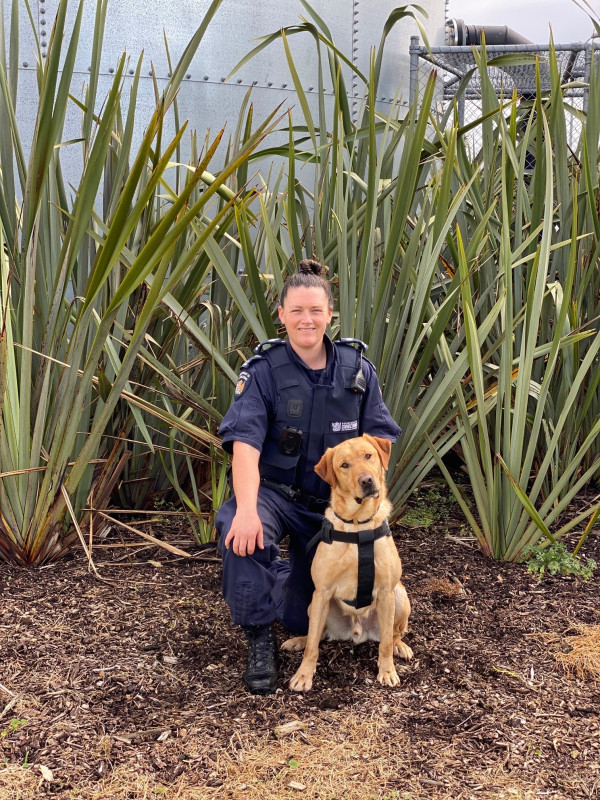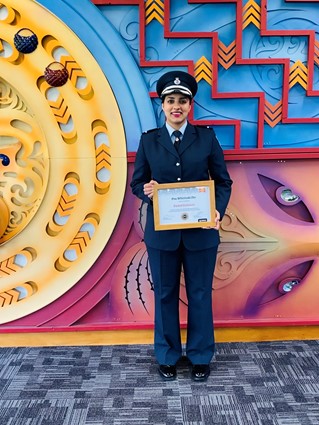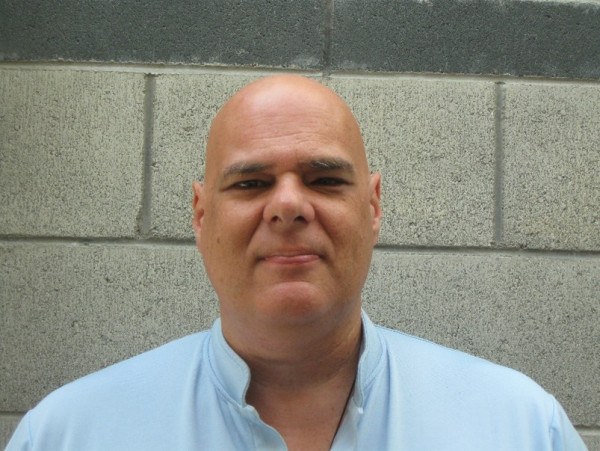12 April 2023
Where can your career go as a Corrections Officer?
For many people, becoming a Corrections Officer is just the start of their journey at Ara Poutama Aotearoa. Promotions, secondments (opportunities to try other positions temporarily), and a range of different roles across the organisation mean that people often move up and across to take on new challenges.
Hannah, a Dog Handler, Farhat, a Probation Officer, and Michael, a Residential Manager are all examples of people who started out as a Corrections Officer and successfully carried their skills and experience forward to different roles. We spoke with them to hear their career journeys, as well as their advice for those interested in career progression at Ara Poutama Aotearoa.
Hannah - Dog Handler

What different roles have you held at Corrections?
I began my career with Ara Poutama Aotearoa in 2017 as a Corrections Officer at Spring Hill Corrections Facility. I worked in a Low Medium unit that housed mainstream prisoners in one pod and prisoners on voluntary segregation in the other. After some time in the unit, I was fortunate to be part of the Site Emergency Response Team (SERT) who work closely with the Dog Handlers and Intel.
In 2019, I was successful in applying to become a Detector Dog Handler and I think I have the best role within the Department!
What is your current role and what does this involve?
I am currently a Detector Dog Handler based in the Northern Region. Every day is different, and plans can change quite quickly based on operational requirements and the fact that we are a regional resource, but I love it!
Core duties often involve checks of the external perimeter, searching prisoner mail/property, targeted searches (cells/houses/offender employment facilities) and prisoners. We have social visits Wednesday through Sunday, so we maintain a strong presence in these sessions, whether that is in the carpark doing a Prison Check Point or within the wire body packing. Being a Detector Dog Handler is a very proactive role, so we are often in and out of the jail, meeting with Intel, the Site Emergency Response Team (SERT) and the Senior Management Team to ensure that as a resource we are being utilised in the most effective way to deter, detect, and defend our sites from illicit drugs and unauthorised items.
Dog Handling is not a 9-5 role, so you need to have some flexibility around the needs of the region.
How did your experience as a Corrections Officer help you in your career progression?
Working on the floor was an important time to learn the basics of working in a prison. The ability to communicate effectively with various stakeholders is very important as a Dog Handler, so spending that time in the unit and then within SERT where you are exposed to situations you may not normally face as a Corrections Officer naturally transferred over as I progressed.
What advice do you have for Corrections Officers interested in moving into a career in dog handling, or exploring career progression more generally?
Get out and spend some time or apply to be in SERT – they work very closely with the Handler/s. Build a rapport with the current Handlers within your region and their dogs; we are all more than happy to help, however you need to be proactive in coming to us. Consider volunteering at an animal shelter/rescue/SPCA. Attend section training days – this is a great opportunity to meet other handlers.
General career progression as a Corrections Officer – my advice would be to learn your role well first! Time on the floor is important; as is having a strong understanding of legislation, policies, and procedures. Ask someone to mentor you. Take opportunities that are presented to you.
Farhat - Probation Officer

What is your current role and what does this involve?
I’m currently a Probation Officer. I work with people that have been sentenced in the community instead of a prison sentence, are still in prison, or who have been released on conditions. Part of my role is to work with individuals, prevent further re-offending and keep the community safe.
How did you go about moving into a Probation Officer role?
The reason why I moved after being a Corrections Officer 2 years is when I felt content and wanted to learn more to get to the bottom of people’s offending and lifestyle. I always knew there was a reason that led them to committing an offence. There are multiple individuals who have genuinely made a mistake and want to make a change in their lifestyle.
How did your experience as a Corrections Officer help you in your current role?
The Corrections Officer role taught me how to work as a team and whānau.
I was blessed to have amazing leaders during my time as a Corrections Officer who taught me how to work together and support each other. As a Corrections Officer I loved the challenge, the people, and the environment which I carried forward to my current role. The training that is provided is a valuable asset for every role within the department which boosted my confidence. Understanding the dynamics of the offender and the offending played a big role in me being able to understand Community Corrections. Not one day is the same or boring. I wanted to be a role model, I wanted to be that woman the little girls around me would look up to and I did it.
What advice do you have for Corrections Officers interested in exploring different career pathways?
Ara Poutama Aotearoa is a land of opportunities for people willing to explore other roles. The Department offers a wide range of opportunities that are never ending along with career progression. Every role has its own challenges which allows individuals to empower themselves.
There are always great people behind you who will support you throughout, you just have to find them. There are respective people in every department within the organisation that are willing to give you a feel and experience for being in that role for a day, just contact the department manager.
Michael– substantive role Residential Manager, seconded to Recruitment and Retention

What different roles have you held at Corrections?
Over the years I’ve been with Corrections, I’ve had around a dozen different roles, including senior roles within the prison and on the corporate side too. These have included Principal Corrections Officer, Residential Manager, and Acting Prison Director. I’ve also had the opportunity to experience the corporate side, with roles such as Manager Custodial Practice, Senior Adviser to the Regional Commissioner, and Senior Adviser to the Chief Custodial Officer.
How did your experience as a Corrections Officer help you in your career progression?
I have learned from each role that I have been in and from the people I have worked with, and I am still learning. I think that’s the key. Once you stop learning, you get can get bored and find the work to sometimes be mundane, so keep learning.
What advice do you have for Corrections Officers interested in becoming a Residential Manager, or exploring career progression for a Corrections Officer more generally?
Take the opportunities and secondments when you can for your own development and be who you are, don’t change your personality when dealing with people. I have always maintained that I am “me” before I am a manager.
Ready to make a move?
Start your journey - check out the a list of our current opportunities then apply online today!